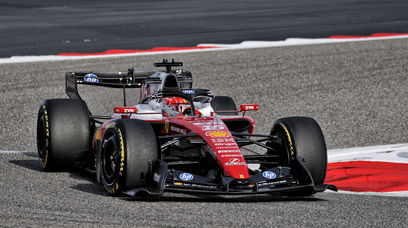Back in January, following various informal discussions with a number of executives in the Red Bull-Porsche axis, we wrote: 'One of the options [for the two parties] is to form a joint venture, with Red Bull managing and funding the project, and Porsche supplying powertrains. 'Such an arrangement would grant the energy drinks company a prestigious automotive partner while Porsche would have to access to the skills of Adrian Newey, the most successful F1 design 'brain' in the history of F1, and his stellar engineering team in Milton Keynes. What is not to like?' This paragraph was not based on speculation, but on informed comments imparted by the players during our discussions. They all stressed, though, that any joint venture between the two parties would be contingent upon the FIA's World Motor Sport Council a) signing off the [then already twice delayed] 2026-onwards power unit regulations, and b) the framework finding favour with Porsche's technical and marketing strategies. At the time of writing this analysis – in the aftermath of a social media storm over a Red Bull-Porsche joint venture – the regulations, although essentially agreed by all parties after going through what was a highly convoluted process, have yet to be formally approved by the Formula 1 Commission before being ratified by the WMSC. Indeed, during the French Grand Prix, Shaila-Ann Rao, the FIA's (interim) Secretary-General for Sport exclusively told RacingNews365.com during her first (and only to date) media interview that she expected the regulations to pass muster "by early August", then distilling the timeframe to "first or second week". Another source thereafter indicated with a twinkle in his eyes that sign-off would likely occur "at 5pm on 5 August, just as F1 closes for its summer break, so we can't argue about the regulations for a fortnight," adding: "The FIA has form in that regard…"
How would a Red Bull/Porsche joint venture work?
Yet another team source stated that while the sporting and technical aspects of the regulations had been finally agreed, various financial issues remained unresolved: "How can you have an equitable budget cap in place for engines when some supply four teams, others three and another two? Renault supplies just one team – it's not like a budget cap for teams, where all have two cars and the same aero and test restrictions…" Let us assume, though, that the various moving parts fall into place to Porsche’s satisfaction and as per the above timeline with the company’s main board providing the definitive green light after three false starts to date, how, then would the JV be structured? According to one of the players who would not go on-record – stating it was still too early to comment – the venture would be structured thus that each partner would have a 50 per cent share, with Red Bull holding a casting vote in the event of stalemates. The plan is to float a new company, which would in turn lease existing Red Bull facilities and infrastructure - including Hall 8, currently being repurposed as Red Bull Powertrains Ltd. Indeed, at the time of my visit to Milton Keynes in January, workmen were beavering away at preparing Hall 8 for the arrival of a number of transient dynamometers and other PU kit from AVL, an Austrian powertrain supplier and consultancy with close links to Red Bull. "They were originally ordered by Porsche, and have been side-tracked here," an Austrian source told me. RacingNews365.com understands that under the plans Red Bull Technology Ltd would provide chassis hardware to the JV, with powertrains built in Milton Keynes by RBT to Porsche's designs and specifications. This arrangement is essentially no different to Red Bull Racing Ltd’s current structure: RBT supplies RBR with technologies which are mated with power units – currently Honda – before being entered and raced by RBR. In fact, perusal of Red Bull Racing Ltd's latest returns as filed with Companies House illustrates the story: the company reported a turnover of £230m via just 59 employees, while Red Bull Technology Ltd's returns show a headcount of 930 heads generating £310m in revenues, predominantly from RBR. Note: The data is as end-2020, with 2021 results expected in September as per UK accounting laws.
How will this affect Red Bull's current Honda agreement?
A simplified structure of the proposed (note) Red Bull-Porsche F1 Team is: Red Bull Racing becomes a joint venture, with Red Bull Technology supplying chassis etc., and Red Bull Powertrains substituting for Honda. RBR manages the operation and provides funding via Red Bull (drinks) and external sponsors, while Porsche and RBT taking joint responsibility for powertrains, designed in Stuttgart, manufactured in Milton Keynes. Hence it was crucial for Red Bull to relinquish any call the company had on Honda's F1 intellectual property as the PU regulations implicitly provide concessions for newcomers – which the Red Bull/Porsche powertrains project is now officially classified as. "The FIA is satisfied that [Red Bull] did not obtain any insights into Honda IP during our partnership, and with the freeze through to end-2025 there is nothing new to learn," our source confirmed during the Canadian Grand Prix. Porsche engines may also be made available to sister team AlphaTauri, assuming the operation remains part of the Red Bull family: There is increasing speculation that the Italian outfit, now an autonomous team with fully-fledged facilities, is for sale, and could be sold off before the new PU regulations come into effect. Any new owner could then cut a deal with RBPT or go elsewhere – such as Renault. All this, though, presupposes that the regulations as eventually approved find favour with Porsche. Until then nothing is certain.
Most read







